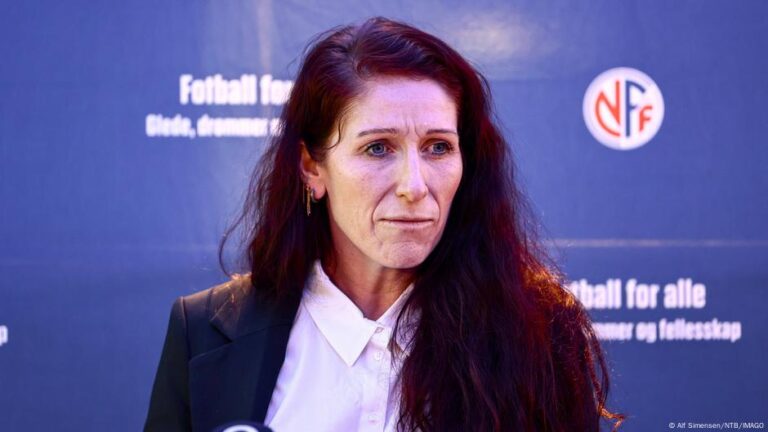Lise Klaveness senses the urgency of the moment in world football, and is calling on other leaders to seize it. The former Norway international player will, on Thursday, become the second woman on UEFA’s Executive Committee (ExCo), after the organization doubled their reserved places for female members to two.
Klaveness, who has been pushing for change in the global game since she became president of her country’s football federation NFF in 2022, wants leadership to be more alert and protect the fundamental values of the European sports model.
“We should be knowledge-based, dialogue-based, but really aware that we’re in a critical time, where fundamental values are in play for real. It’s not just a media headline. The sports model of Europe is now under pressure, more pressure than it has ever been. And if we like it, if we want to keep that democracy in sports, we have to be ready to argue for it, to talk about it, to put our pressure into it,” Klaveness told DW.
The Norwegian has long been outspoken about human rights violations and the legitimacy of bidding processes, specifically at the 2022 World Cup in Qatar and the upcoming 2034 tournament in Saudi Arabia. In December 2024, after Norway was drawn in a World Cup qualifying group with Israel, she also had her say on Israel’s attacks on Gaza.
“It is difficult for us beyond the purely sporting aspect,” Klaveness said at time. “None of us can remain indifferent to the disproportionate attacks that Israel has subjected the civilian population in Gaza to.”
Since making the comments, Klaveness told DW she has been forced to constantly clarify her position, and that of the NFF.
“People say to me, why don’t you want to boycott the United States now? You wanted to boycott Qatar? No, we did not want to boycott Qatar. That was the whole point. We wanted to attend, but we did not qualify,” Klaveness said. “We played Israel, too. But that doesn’t mean that we should not fight for our core values.”
Unequal game
Klaveness is the first woman to lead the NFF and, in 2023, tried to make more history by winning a seat on the UEFA Executive Committee that is not specifically reserved for a woman. Facing 10 male candidates for the seven seats up for grabs at the UEFA Congress, Klaveness received just 18 of the 55 possible votes and finished tenth (out of 11). The result meant there has only been one woman among the 20 members of the UEFA ExCo — until this week, when Klaveness will join Laura McAllister of Wales, following last year’s rule change.
When in position, Klaveness wants more clarity over football’s vision for future governance. And with her seat at the table comes real understanding of how to embrace and improve women’s football.
“It’s also a question of competence, because we’ve had very many men representing football on different boards, and most of them, I would say more than 90% ,would come from the men’s football side, never from the women’s football side,” Klaveness said before pointing to differences between sexes in sporting and physiological terms.
More European women’s leagues needed
“When girls go into puberty it’s a different performance framework than it is for men. The demands are different,” Klaveness continued. “The market is also different when you go into pregnancy, and afterwards come back to perform.”
There are many issues facing women’s football at the moment, but for the Norwegian, perhaps the most pressing is preventing the elite from breaking away from the rest.
“I think now, it’s very important to really understand what we need to do underneath the top four leagues, so that the head doesn’t move away from the body. We need more professional leagues in Europe, so that girls in all countries can dream of having this as a profession — leader, coach, player.”
DW’s interview with Lise Klaveness was conducted by Dana Sumlaji.


